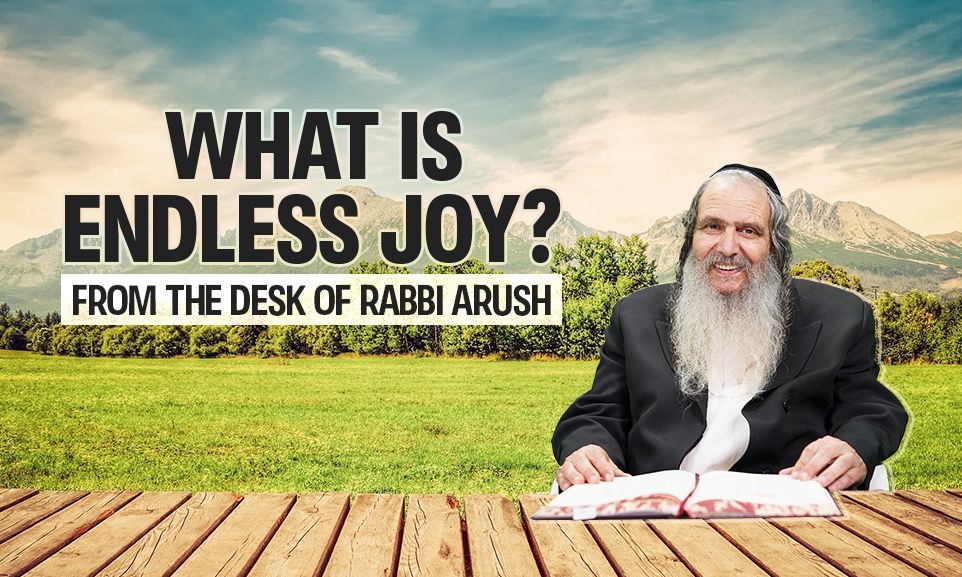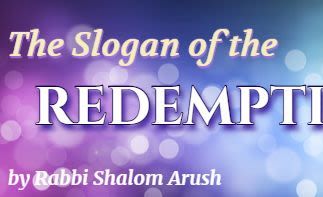
What is Endless Joy?
How can you achieve being truly happy for another? Only by praying for the Jewish people! If you take on this prayer as a personal commitment, another Jew’s joy becomes your own personal joy.

Translated from Rabbi Arush’s feature article in the weekly Chut shel Chessed newsletter. The articles focus on his main message: “Loving others as yourself”.
A Rabbi or an Information Desk Attendant?
A man encountered a complex and urgent halachic problem and called an important Rav and posek (rabbi who determines the halacha) from his community. The rabbi understood the severity of the issue and told him he would get back to him immediately. The rabbi then made a few phone calls, got back to the person who asked the question and referred him to the appropriate people. The Jew followed the rabbi’s guidance and indeed, everything worked out well.
This is a rather routine story, and usually this is where such a story ends. But the man took one more small step: After everything had been settled satisfactorily, he called the rabbi back and told him that, Baruch Hashem, everything had been worked out. The rabbi was very happy and said to him:
“Bravo for calling to tell me this. You don’t know how many people call me at all hours with various problems, and I feel their pain and do my best to help them, and if things don’t work out immediately, they call again and again; but only a few take the trouble to call and tell me about the happy end. They don’t understand that I am not an information desk attendant who passes on information and doesn’t really care what the caller will do, but rather a person, and I have a heart, and I am really concerned about their welfare and their success. They don’t know that I would be very happy to hear that they have solved the problem. Thank you for calling to tell me. You have made me happy.”
The Joy of a Jew
The great rabbis were renowned not only for their deep Torah knowledge, and not only for their strong and vibrant emuna, and not only for their fine character traits and for helping others. The great rabbis – and of course each and every one of us who want to follow in their footsteps – were really concerned for every Jew and were really happy to hear of the success of every Jew. They brought salvation to the Jewish people only because the salvation of every Jew was for them their own personal salvation.
We are in the month of Adar, in which we are supposed to increase our simcha (joy, gladness). What is joy? What should make us joyful?
The Tiferet Shlomo, Rabbi Shlomo of Radomsk, one of Poland’s tzaddikim and rebbes, enlightens us that the joy one feels at his own success and his own salvation and his own good – that is reprehensible joy! And in his own words: “If a person doesn’t observe and pray [for others], only for himself, and is joyful only about his own good – that is very reprehensible.”
So what is the perfect joy? What is a praiseworthy joy? We’ll bring, again, the words of the Tiferet Shlomo: “This is the main thing, what a person prays for his fellow and is happy and joyous about his salvation… This is truly a good trait in a person, who is worthy of praise in the holy Torah.”
A Joyous Heart
We read in this week’s parasha about the clothing of the Cohen Gadol (high priest) and of the precious stones on Aharon’s heart, and Chazal say that he merited that because of “And he will see you and will rejoice in his heart” – he experienced true joy at his younger brother meriting such a high stature.
For many long years of suffering and servitude, Aharon had been the de facto leader, and had carried the yoke of Bnei Yisrael on his shoulders during the most difficult years. And a moment before the redemption, his younger brother appears out of nowhere and receives all the greatness and honor. The Creator of the World, who knows what is in human beings’ hearts, testifies that Aharon Hacohen was free of jealousy and was truly happy, seeing his brother’s elevation. This is unbelievable greatness!
And it is also true joy, a clean joy, for which Aharon Hacohen merited the shining Choshen resting on his heart.
We have another example of such greatness in David Hamelech who said: “You have placed gladness in my heart from the time that their grain and wine abound.” He was not glad that he himself had abundance, rather that some other Jews had abundance and success!
Endless Joy
Therefore, the first piece of advice regarding joy that arises from this is: To be happy for others. Baruch Hashem, there are many simchas (happy occasions) among Jews. One should pay attention and feel joy and satisfaction at every simcha, success, and salvation of every Jew.
But actually, the greatest thing is to be happy with your fellow’s spiritual success, as Rabbi Nachman says in one of his most amazing and wondrous talks: “When he is pleased and wants and very much wishes that his fellow should be a kosher and righteous person, even though he won’t be, chas veshalom, that is a very great virtue.”
If you see another Jew praying with kavana (concentration), learning diligently, raising successful children, and such like – and you are really happy for him, you have no idea what a wonderful joy that is! That is the way to true, inner joy, the kind Hashem wants. And it is an endless joy, because there is no end to the good things and the simchas and the successes among Jews, and you will always have more and more reasons to be joyous.
More Advice
But there is another piece of advice, a deeper one, which can grant you the ability to be truly happy for another person. For it is no small thing to be happy for another. How can one achieve that?
Let’s return to the words of the Tiferet Shlomo: “This is the main thing, when a person prays for his fellow and is happy and joyous about his salvation.” When one sees this in context, one sees he is talking about joy, so why is he bringing in the matter of prayer?
It is clear from his words that the way to achieve true joy at seeing the good his friend is enjoying is only by praying for the Jewish people. Because if he really cares and feels responsible for his fellow and takes it as a real personal commitment, his fellow Jew’s joy is for him a real personal joy.
The Tiferet Shlomo also emphasizes that we are not talking about random prayers here and there, but rather about a person who feels committed and sees the refraining from prayer for the people as being a great sin, and therefore he prays regularly for the success of all Jews. Only such a person who yearns for the Jewish people’s success and prays for them – only he can truly be joyful when the other person enjoys success!
The Root of Joy
So, we have learned that praying for the Jewish people is not only an obligation, and not only the best piece of advice to achieve our own personal success in our service of Hashem, and not only the greatest pleasure that Hashem has – as we have already written at length in many articles – but rather it is the best way to achieve true joy.
Our Sages say that he who separates himself from the community when they are in distress and does not pray with them, the two angels who accompany him hit him on the head and say to him, “He who has not participated in the community’s distress, will not see the community’s consolation.” This is, of course, a terrible and frightening curse. But according to what we have written here, it is also a natural and obvious result. Because if you do not feel obligated towards the community and their distress doesn’t move you, then obviously you will not feel joy when they are saved, because their joy also doesn’t move you.
Light and Joy
The Tiferet Shlomo explains according to this the pasuk brought in the prophecies of the future consolation: “The redeemed of Hashem will return and come to Zion with glad song, with eternal simcha upon their head.” What is “eternal gladness”? Says the Tiferet Shlomo: “That the simcha of the entire world when others are living well – is upon their head.”
Any simcha in the world is limited. Only the joy at the end of time is eternal, unending. And why? Because in this world a person is glad for himself. It is a joy of only one person, and even that one doesn’t last forever. But he who is glad in the happiness of all Jews in this world, is glad at any moment with the happiness of the entire world together! This is already a huge, unlimited simcha that is renewed every moment.
The light of Purim is the light of simcha. Not a momentary simcha and not a simcha involving wild behavior, and not even a private spiritual simcha. It is the simcha of all Jews: “The Jews had light and simcha and gladness and honor.” Whoever merits to pray at length for the Jewish people and to feel the great responsibility placed upon us, especially in these days, and takes upon himself the obligation to pray for the Jewish people – he is the one who merits to come to Purim with great and immense simcha – “eternal simcha upon his head”!












Tell us what you think!
Thank you for your comment!
It will be published after approval by the Editor.